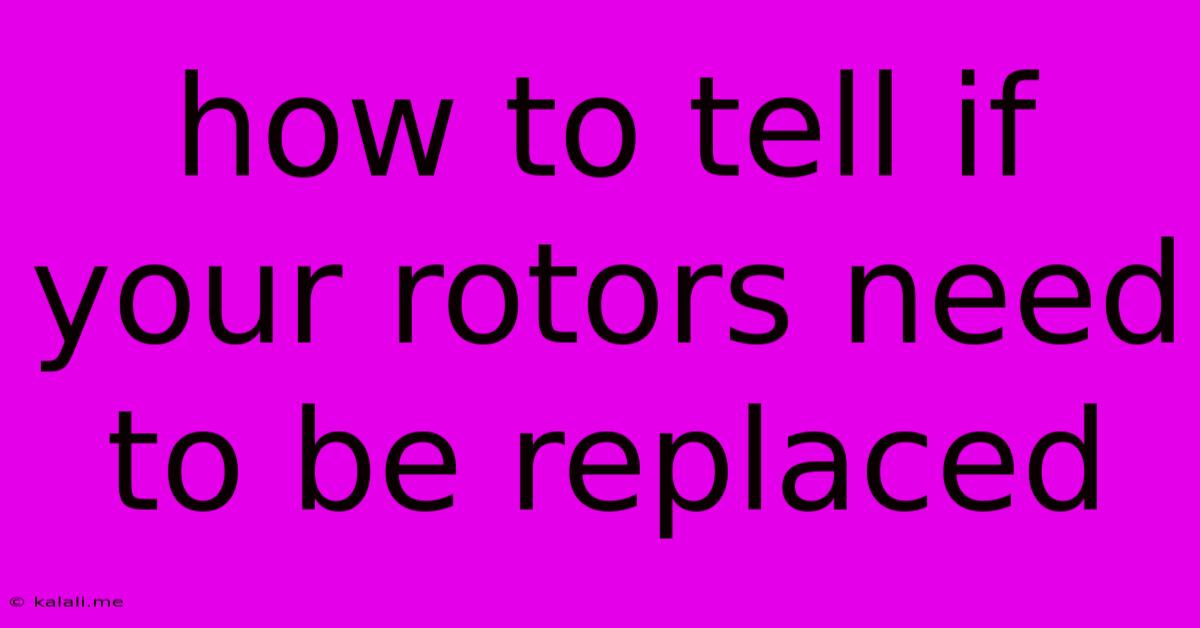How To Tell If Your Rotors Need To Be Replaced
Kalali
Jun 08, 2025 · 3 min read

Table of Contents
How to Tell if Your Rotors Need to Be Replaced
Your car's brake rotors are crucial for safe and effective braking. Ignoring signs of wear and tear can lead to reduced braking performance and, potentially, dangerous situations. This article will guide you through the key indicators that your rotors need replacing, helping you stay safe on the road. Understanding these signs can save you from costly repairs down the line and ensure your braking system is always in top condition.
Visual Inspection: The First Line of Defense
The easiest way to assess your brake rotors is through a visual inspection. While you might need to jack up your car for a thorough look, here's what you should be looking for:
- Grooves and Scoring: Deep grooves or scoring on the rotor's surface indicate significant wear. These irregularities can cause brake pad vibration and reduced braking efficiency. Shallow grooves are usually less concerning, but consistently deep grooves are a clear sign of needing replacement.
- Rust and Corrosion: Surface rust is common, particularly in areas with high humidity. However, excessive rust or significant corrosion that penetrates the rotor's surface can weaken the rotor and compromise its braking ability. Look for pitting or flaking.
- Excessive Thickness Variation: Brake rotors should ideally maintain a uniform thickness. Significant variations in thickness, particularly if uneven wear is present, indicates potential warping and uneven braking pressure, necessitating replacement.
- Cracks or Breaks: Any cracks or breaks in the rotor material are serious and require immediate replacement. These compromise the structural integrity of the rotor and create a significant safety hazard.
Performance Indicators: Beyond Visual Inspection
While a visual inspection is crucial, performance issues can also signal the need for rotor replacement:
- Vibrating Brakes: A pulsating or vibrating brake pedal, especially when braking at higher speeds, often points towards warped rotors. This uneven braking surface causes the brake pads to vibrate, leading to the noticeable pulsation.
- Reduced Braking Performance: If you notice that your braking distance has increased significantly, it could indicate worn or damaged rotors. This is especially true if accompanied by other symptoms like noise or vibration.
- Grinding or Screeching Sounds: While squealing brakes often indicate worn brake pads, a grinding or metallic screeching sound usually points to significant rotor wear, potentially scraping metal-on-metal. This needs immediate attention.
- Brake Pedal Sponginess: A soft or spongy brake pedal, where you have to push the pedal further down than usual to achieve effective braking, can signal brake system issues including rotor problems.
When to Consult a Professional
While you can perform a visual inspection yourself, it's always best to consult a qualified mechanic for a thorough brake system inspection. They possess the necessary tools and expertise to accurately assess the condition of your rotors, measure their thickness, and determine if replacement is needed. Regular brake inspections as part of your vehicle maintenance schedule can prevent unexpected issues and ensure your safety.
In Conclusion: Regularly inspecting your brake rotors, paying attention to both visual indicators and performance issues, is essential for maintaining optimal braking performance and safety. Don't hesitate to seek professional advice if you're unsure about the condition of your rotors. Replacing worn rotors is a critical safety measure that should never be overlooked.
Latest Posts
Latest Posts
-
What Is The Word For Power In Latin
Jun 09, 2025
-
How To Heat A Frozen Burrito
Jun 09, 2025
-
How To Kill The Wither Easily In The End
Jun 09, 2025
-
How To Attach Casters To Metal Legs
Jun 09, 2025
-
What Does Econ Mean On Ac
Jun 09, 2025
Related Post
Thank you for visiting our website which covers about How To Tell If Your Rotors Need To Be Replaced . We hope the information provided has been useful to you. Feel free to contact us if you have any questions or need further assistance. See you next time and don't miss to bookmark.